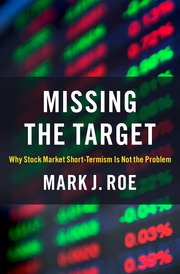Missing the target
why stock-market short-termism is not the problem
- ISBN: 9780197625620
- Editorial: Oxford University Press
- Fecha de la edición: 2022
- Lugar de la edición: Oxford. Reino Unido
- Encuadernación: Cartoné
- Medidas: 23 cm
- Nº Pág.: 186
- Idiomas: Inglés

According to many political leaders, pundits, and corporate lawmakers, stock-market-driven short-termism - when corporations prioritize immediate results in the next quarter over their longer-term interests - is harming the American economy. This view, popular in influential circles, sees short-termism as causing sharply declining research and development (R&D), too many stock buybacks, and severe environmental harm. But the data fits badly with this black-and-white representation of short-termism.
Mark J. Roe analyzes the best data on R&D, corporate borrowings and buybacks, and long-term investment trends to show that stock market short-termism is not at the root of these economic problems. The book shows that blaming short-termism overlooks the real causes of declining investment, R&D changes, and environmental deterioration. By pointing to other sources of tension like accelerating technological change, rising political uncertainty, and repeated economic disruptions, Missing the Target argues for a more nuanced understanding of the challenges to the American economy. Roe disproves many of the core claims against short termism. R&D spending, for example, is rising faster than the economy is growing. Its government R&D support that's been falling. Reversing that decline is the best first target for bettering American R&D.
PART I: Looking for Stock-Market-Driven Short-Termism's Impact on the Economy
1. The Short-Term Problem Perceived
2. Looking for the Economy-Wide Impact
3. The Social Costs of Stock-Market Short-Termism Understood, Clarified, and Defined
4. The Heavy Cost of Misdiagnosis: Missing the Targets
PART II: Analyzing the Stock Market's Impact
5. Concept and Evidence for Stock-Market-Driven Short-Termism
6. Concept and Evidence Against It
7. Evaluating the Firm-by-Firm Short-Termism Evidence
PART III: The Proposed Solutions' Limited Efficacy-And Their Costs
8. Cures and Their Sharp Limits: Insulating Executives from Financial Markets
9. Cures and Their Sharp Limits: Taxing and Regulating Financial Markets
PART IV: The Politics of the Corporate Short-Termism Controversy
10. Confusing Short-Termism with Accelerating Technological Change
11. Short-Termism as Popular Narrative: Connotation, Category Confusion, and Confirmation
12. Political Support at the Top of the Corporation: Executives vs. Shareholders









